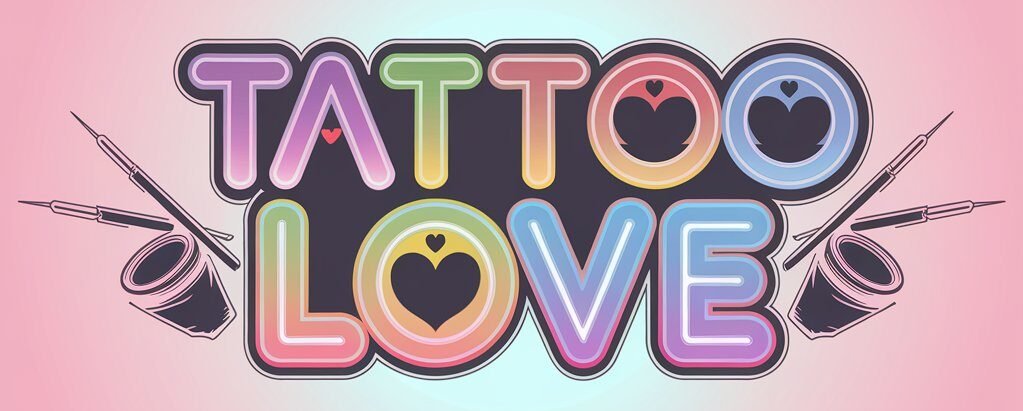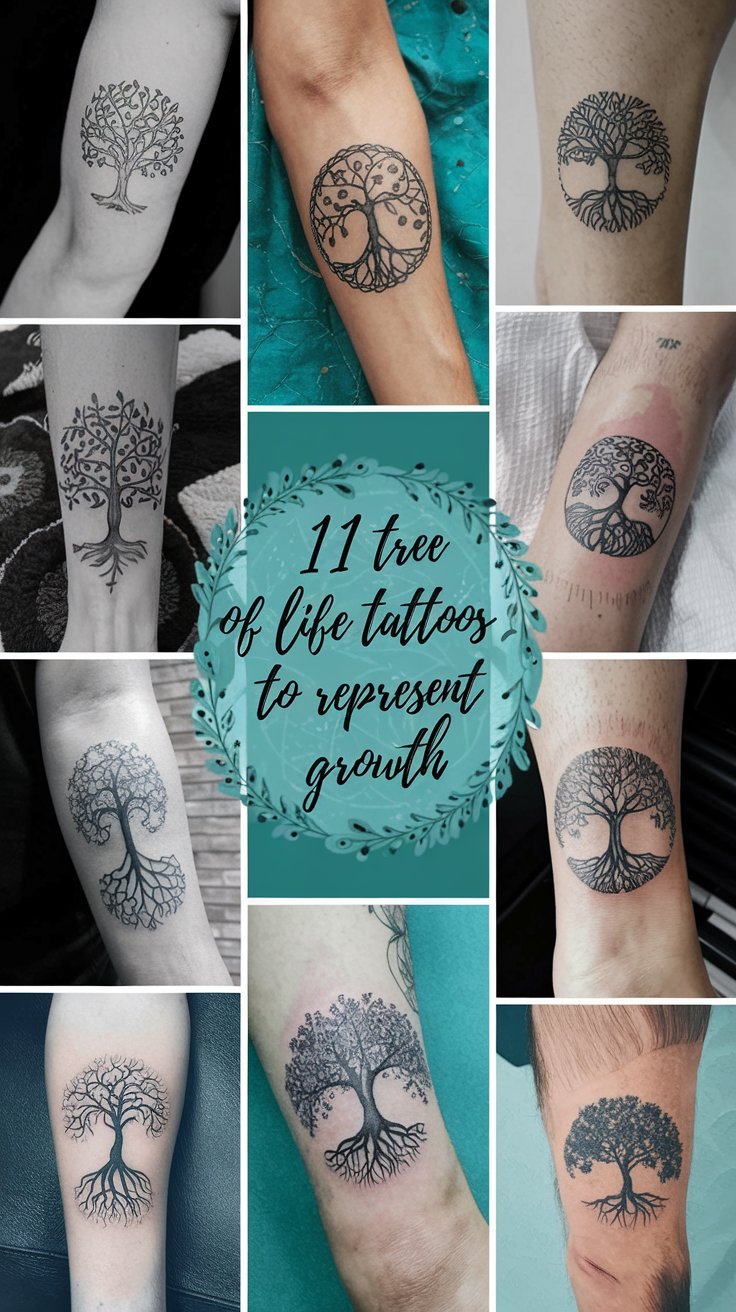10 Traditional Yakuza Tattoo Ideas In 2025 With Deep Meaning
You’re probably familiar with koi fish and cherry blossom tattoos, but there’s more to traditional Yakuza designs than meets the eye. Dragons symbolize strength and power, often paired with snakes to represent transformation and renewal.
Hannya masks represent the struggle between good and evil, while peony flowers embody honor and integrity. Waves and water patterns symbolize the ocean’s power and the ebbs and flows of life.
By exploring these motifs further, you’ll discover the rich cultural significance and deep meanings behind each symbol, revealing the intricate world of traditional Yakuza tattoo art. The stories behind these designs are waiting to be unraveled.
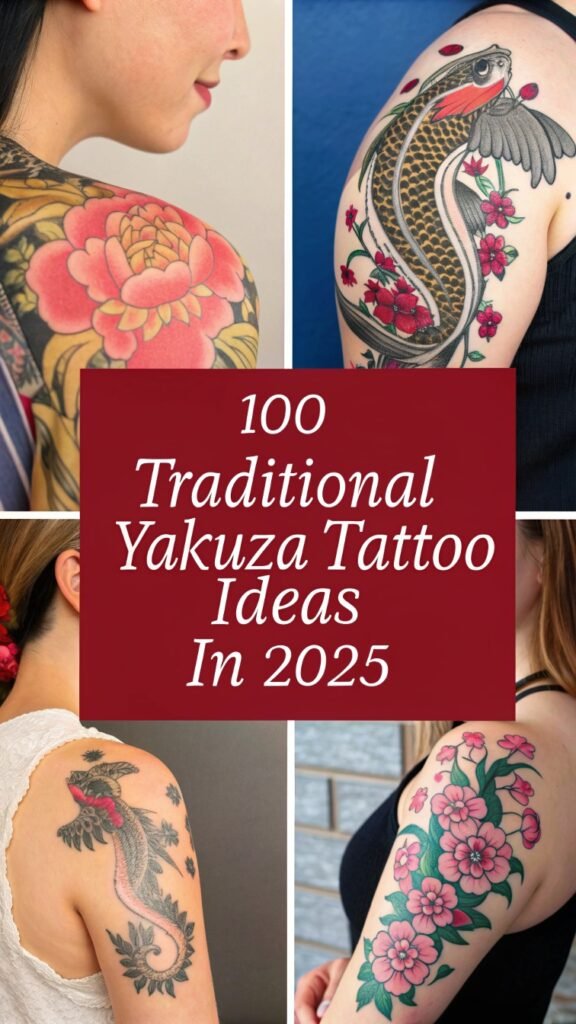
Koi Fish Symbolism
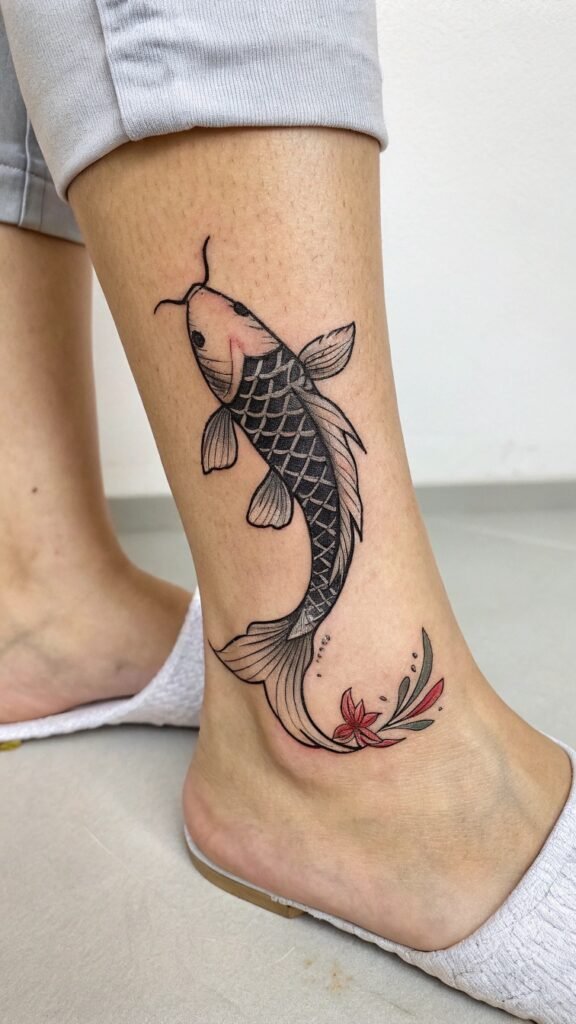
Delving into the world of traditional Yakuza tattoos, you’ll often find the koi fish, a symbol that represents perseverance, courage, and strength.
This majestic aquatic creature is often depicted in various colors and patterns, each carrying its own significance.
The vibrant hues of the fish scales signify its ability to overcome adversity and emerge stronger.
In Yakuza culture, the koi fish is revered for its aquatic strength, symbolizing the capacity to navigate through turbulent waters and rise above challenges.
In Japanese culture, the koi fish is associated with good fortune and prosperity.
Its ability to swim upstream against strong currents is seen as a badge of honor to its determination and resilience.
As a tattoo design, the koi fish is often paired with other elements, such as water and waves, to emphasize its connection to the natural world.
The intricate details of the fish scales and the fluid movement of the design reflect the harmony and balance that the koi fish embodies.
Cherry Blossom Tattoos

A single cherry blossom tattoo can convey a wealth of meaning in traditional Yakuza culture.
You’ll often see these delicate flowers paired with other symbols or motifs, but on their own, they represent the fleeting beauty of life.
In Yakuza culture, the cherry blossom is a poignant reminder that life is short and can change quickly.
When you get a cherry blossom tattoo, you’re acknowledging that life’s beauty is transient.
These flowers bloom for a brief time in the spring, and their petals fall off just as quickly.
This ephemeral nature makes them a powerful symbol of the impermanence of life.
In Yakuza culture, the arrival of spring is marked by the blooming of cherry blossoms, which represents new beginnings and the cyclical nature of life.
As you consider getting a cherry blossom tattoo, think about what it means to you personally.
Are you acknowledging the fleeting nature of life, or are you celebrating the beauty of new beginnings?
Whatever your reason, this tattoo is sure to be a meaningful and thought-provoking addition to your body art.
Dragon Designs

When it comes to traditional Yakuza tattoos, dragon designs are a staple, symbolizing strength, power, and good luck in Japanese culture.
You’ll often find these majestic creatures depicted in various poses, showcasing their impressive dragon anatomy.
From the sharp claws to the fiery breath, every detail holds significance in dragon mythology.
In traditional Yakuza tattoos, dragons are typically drawn with five claws, which represent the five virtues of the samurai: benevolence, righteousness, propriety, wisdom, and sincerity.
You may also notice that some dragons have three claws, symbolizing the connection between heaven, earth, and humanity.
As you explore the world of Yakuza dragon tattoos, you’ll discover a rich tapestry of symbolism and meaning.
Dragons are said to possess the power to bring good fortune, ward off evil spirits, and even grant wisdom.
By getting a dragon tattoo, you’re not only showcasing your strength and resilience but also inviting good luck and prosperity into your life.
With their intricate designs and deep symbolism, it’s no wonder that dragon tattoos remain a popular choice among Yakuza members and tattoo enthusiasts alike.
Waves and Water

Beyond the formidable dragon designs, waves and water patterns play a significant role in traditional Yakuza tattoos, often serving as a visual complement to the dragons and other motifs.
These wave patterns are known as “seigaiha,” and they symbolize the ocean’s power and the ebbs and flows of life. In Yakuza culture, the ocean is revered as a representation of the infinite and the unknown, and the waves are seen as a reminder of the constant changes that occur in life.
When you look at traditional Yakuza tattoos featuring waves and water, you’ll often notice that they’re accompanied by sea creatures such as koi fish, turtles, and dragons.
These creatures are meant to represent the balance and harmony that exist between the ocean’s power and the individual’s strength. The ocean currents that these creatures navigate symbolize the journey through life, with its ups and downs, twists and turns.
In traditional Yakuza tattoos, waves and water patterns serve as a reminder of the importance of adaptability and resilience in the face of life’s challenges.
Hannya Mask Tattoos

You’ve seen the ocean’s power and life’s ebbs and flows represented in traditional Yakuza tattoos through waves and water patterns.
Now, it’s time to explore into the world of Hannya mask tattoos, which embody a different kind of energy.
These tattoos feature a mask with fearful expressions, symbolizing the struggle between good and evil.
The Hannya mask is a representation of the complexity of human emotions and the duality of life.
In traditional Japanese theater, the Hannya mask is used to portray a jealous or vengeful spirit, often associated with the supernatural domain.
As a tattoo, it’s a symbol of the wearer’s ability to confront and overcome their own inner demons.
The mask’s Demonic beauty is mesmerizing, with intricate details and bold lines that evoke a sense of intensity.
When worn as a tattoo, the Hannya mask is a reminder of the wearer’s strength and resilience in the face of adversity.
It’s a badge of honor, signifying their ability to navigate life’s challenges with courage and determination.
The Hannya mask tattoo is a powerful symbol of the human experience, and its meaning runs deep in the world of traditional Yakuza tattoos.
Snake and Dragon

In traditional Yakuza tattoos, snakes and dragons are two of the most revered and symbolic creatures.
These mythological beings have been intertwined in Japanese folklore for centuries, representing opposing forces of good and evil.
As you explore into the world of Yakuza tattoos, understanding the symbolism behind these creatures is essential.
Snake symbolism is complex and multifaceted, often representing transformation, renewal, and healing.
In contrast, dragon mythology is deeply rooted in Japanese culture, symbolizing power, strength, and good luck.
When combined, these creatures convey a sense of balance and harmony.
- Duality: Snakes and dragons represent opposing forces, highlighting the balance between good and evil.
- Symbolism: Snakes symbolize transformation, while dragons represent power and strength.
- Cultural significance: Both creatures are deeply rooted in Japanese mythology and folklore.
- Artistic representation: Tattoos often depict snakes and dragons in intricate, detailed designs, showcasing the artist’s skill and craftsmanship.
Peony Flowers

As you explore the domain of traditional Yakuza tattoos, you’re likely to notice another striking symbol: the peony flower.
This beautiful bloom holds deep cultural significance in Japanese tradition, and its incorporation in Yakuza tattoos is no exception. In the context of tattoo art, the peony often represents good fortune, prosperity, and honor – qualities highly valued by the Yakuza.
The peony flower arrangement in tattoos can also convey a sense of distinction and refinement.
In traditional Japanese culture, the peony is often paired with other flowers, such as the chrysanthemum or the plum blossom, to create a harmonious balance. This deliberate pairing can add layers of meaning to a tattoo design, as each flower contributes its unique significance to the overall piece.
In Yakuza tattoos, the peony flower’s bold petals and delicate center often symbolize the balance between strength and vulnerability.
As a tattoo, the peony can signify an individual’s ability to navigate complex social dynamics while maintaining their integrity and honor. By choosing the peony as a tattoo design, you’re embracing a symbol that embodies the essence of Yakuza values.
Carp and Koi Fish
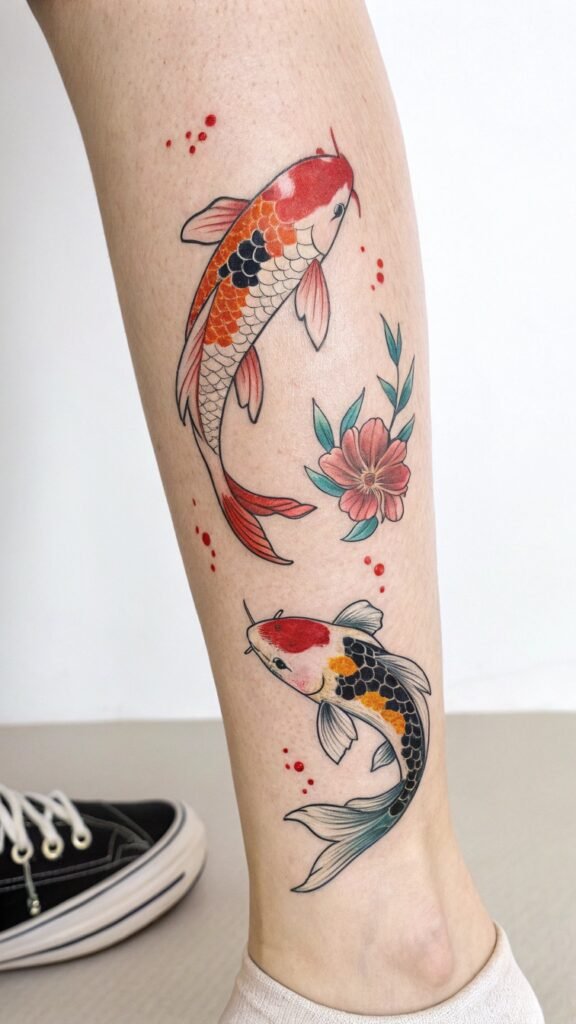
Japanese tattoo culture has a long history of incorporating fish motifs, particularly carp and koi fish, which symbolize perseverance, courage, and good luck.
When you see a carp or koi fish tattoo, you’re looking at a symbol of strength and resilience.
In Japanese culture, these fish are revered for their ability to swim upstream, overcoming obstacles and adversity.
The significance of carp and koi fish tattoos can be broken down into several key aspects:
- Perseverance: Represented by the fish’s ability to swim upstream, overcoming obstacles and adversity.
- Courage: Embodied by the fish’s bold and fearless nature.
- Good luck: Associated with the fish’s ability to bring prosperity and fortune.
- School unity: Represented by the fish’s tendency to swim in schools, symbolizing loyalty and camaraderie.
When it comes to the design of carp and koi fish tattoos, the details are just as important as the symbolism.
The scales, for example, are often intricately designed to mimic the real thing, adding an extra layer of depth and meaning to the tattoo.
Whether you’re a fan of traditional Japanese art or simply looking for a symbol of strength and resilience, a carp or koi fish tattoo is definitely worth considering.
Traditional Japanese Hannya

A Hannya mask, with its hauntingly beautiful features, is an iconic symbol of traditional Japanese tattoos.
You’ll often see it paired with other mythological creatures, adding an air of mystery and power to the overall design.
In Japanese myth, the Hannya is believed to be a demon that symbolizes the struggle between good and evil.
This dichotomy is reflected in its dual nature: the Hannya is said to possess both gentle and malevolent qualities.
In traditional Japanese tattoos, the Hannya is often depicted with sharp horns, fierce eyes, and a wide, toothy grin.
This design is meant to evoke a sense of fearlessness and strength.
According to Demon legends, the Hannya is a creature that can bring both good luck and bad fortune, depending on the context in which it’s used.
As a tattoo design, the Hannya is often used to symbolize transformation, as it’s said to represent the struggle between light and darkness.
When paired with other symbols, the Hannya can add a rich layer of meaning to your tattoo, making it a powerful expression of your personal identity.
Skull and Snake

In traditional Yakuza tattoos, skulls and snakes are often paired together to symbolize the duality of life and death, as well as the resilience and adaptability required to overcome adversity.
This iconic combination represents your ability to thrive in the face of danger and uncertainty. By embracing the skull and snake design, you’re signifying that you’re not afraid to walk the fine line between life and death.
When paired with a snake, the skull takes on a new meaning, symbolizing the Deadly Deception that often accompanies life in the Yakuza.
This duality serves as a reminder that you must be prepared to face challenges and overcome them with cunning and stealth.
The snake itself is often associated with the Snake Rebellion, a symbol of transformation and renewal.
In traditional Yakuza tattoos, the snake can represent:
- Stealth and cunning: Your ability to navigate complex situations with ease.
- Adaptability and resilience: Your capacity to thrive in the face of adversity.
- Renewal and transformation: Your willingness to shed your old skin and start anew.
- Deadly precision: Your ability to strike with precision and accuracy.
Frequently Asked Questions
What’s the Average Cost of a Traditional Yakuza Tattoo?
When you consider getting a traditional tattoo, you’re likely wondering about the cost. You’ll find tattoo artists charge differently, but prices range from $100 to $500 per hour. Be aware, cultural appropriation concerns exist.
Can Yakuza Tattoos Be Worn by Non-Japanese People?
When considering a traditional Japanese tattoo, you’re likely aware of cultural appropriation concerns. To avoid misunderstandings, research tattoo etiquette and consult a reputable artist, showing respect for the culture and tradition behind the design.
What’s the Significance of Tattoo Placement on the Body?
When you get a tattoo, you’re choosing more than just a design – you’re selecting a symbolic placement on your body that reflects personal expression and holds spiritual significance, making every piece of body art unique.
How Long Does It Take to Complete a Traditional Yakuza Tattoo?
You’ll spend years honing skills through a tattoo apprenticeship to master artistic nuances, but actually completing a single piece can take anywhere from several days to several years, depending on its complexity and your skill level.
Do Yakuza Tattoos Have Any Cultural or Social Implications?
You’ll find that certain tattoos can profoundly impact your social life and interactions, as they often reflect a strong cultural identity and may challenge or conform to existing social norms in various communities and cultures.
